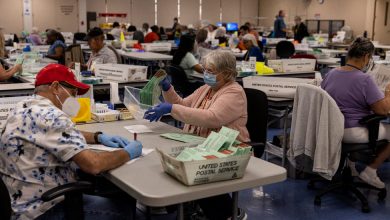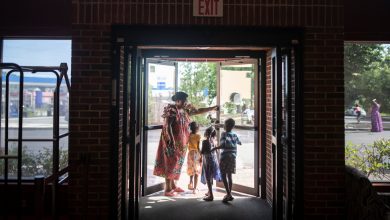Manchin Defends Retreat on Climate and Tax Plans, Calling for More Time

WASHINGTON — Senator Joe Manchin III, Democrat of West Virginia, on Friday defended his decision to pull the plug on his party’s efforts to pass a major climate, energy and tax package this summer, hinting that he might still be open to supporting such action later in the year.
Mr. Manchin’s comments, in an interview with a West Virginia radio host, were the latest instance in which the conservative-leaning senator has dangled the possibility that he might eventually support key pieces of President Biden’s agenda even as he positions himself as the chief Democratic impediment to enacting them.
His remarks came the day after he indicated in a private conversation with Senator Chuck Schumer of New York, the majority leader, that if Democrats moved forward as planned with a legislative package this summer, he would not accept any climate or energy measures or tax increases on wealthy Americans or corporations.
In the interview with the radio host, Hoppy Kercheval, Mr. Manchin said he had told Mr. Schumer that he wanted to wait to act on climate and tax proposals until inflation figures for the month of July were public.
“Let’s wait until that comes out, so we know that we’re going down the path it won’t be inflammatory, to add more to inflation,” Mr. Manchin said he had told Mr. Schumer. He added: “Can’t we wait to make sure that we do nothing to add to that? And I can’t make that decision on basically on taxes of any type, and also on the energy and climate.”
Inflation F.A.Q.
What is inflation? Inflation is a loss of purchasing power over time, meaning your dollar will not go as far tomorrow as it did today. It is typically expressed as the annual change in prices for everyday goods and services such as food, furniture, apparel, transportation and toys.
What causes inflation? It can be the result of rising consumer demand. But inflation can also rise and fall based on developments that have little to do with economic conditions, such as limited oil production and supply chain problems.
Is inflation bad? It depends on the circumstances. Fast price increases spell trouble, but moderate price gains can lead to higher wages and job growth.
How does inflation affect the poor? Inflation can be especially hard to shoulder for poor households because they spend a bigger chunk of their budgets on necessities like food, housing and gas.
Can inflation affect the stock market? Rapid inflation typically spells trouble for stocks. Financial assets in general have historically fared badly during inflation booms, while tangible assets like houses have held their value better.
Should Democrats insist on pushing forward with legislative action before then, Mr. Manchin said, they should act only on proposals aimed at lowering the cost of prescription drugs and extending expanded Affordable Care Act subsidies.
That stance effectively scuttled the chances of action in the coming days on a critical priority for Democrats and strongly suggested that unless they abandoned the climate and tax proposals altogether, they would risk being unable to salvage any piece of their signature domestic policy package before the midterm congressional elections in November. Inflation numbers for July are scheduled to be released on Aug. 10, after the Senate will have left Washington for a five-week summer break.
When lawmakers return in September, they will have only a limited time window to act on the package. And they are eager to give themselves as much time as possible to campaign on whatever they pass before the November elections.
The waiting game situated Mr. Manchin once again at the center of a high-stakes political and policy negotiation for Democrats, who have toiled for months to win his vote on any piece of their once-ambitious domestic agenda. They have contorted themselves to suit his often-changing dictates and have scaled back their ambitions repeatedly to stay within his red lines, but they have so far come away empty-handed on their biggest priorities.
Because of Democrats’ razor-thin margin of control in the 50-50 Senate and unified Republican opposition to most of their top priorities, Mr. Manchin has effective veto power over the party’s legislative strategy — and has exercised it often and unapologetically. Bearing political scars from a year of fractious talks, few Democrats on Friday seemed willing to gamble that Mr. Manchin would be willing to return to negotiations and take up the climate and energy provisions.
One senator, Martin Heinrich, Democrat of New Mexico, mused publicly about whether Mr. Manchin deserved his chairmanship of the Senate Committee on Energy and Natural Resources.
Using the abbreviation for the committee, Mr. Heinrich wrote on Twitter: “Senator Manchin’s refusal to act is infuriating. It makes me question why he’s Chair of ENR.” He added: “This is THE moment to meet the challenges that we will be judged by — by our children, grandchildren and future generations. We can’t wait any longer.”
In the radio interview, Mr. Manchin insisted that he remained committed to negotiations but would not bow to what he described as a pressure campaign from his own party.
“I am where I have been — I would not put my staff through this, I would not put myself through this if I wasn’t sincere about trying to find a pathway forward to do something that’s good for our country,” Mr. Manchin said. “They cannot come to grips because I have a ‘D’ by my name or someone has an ‘R’ by their name, we should do whatever one side wants. That’s not me.”



